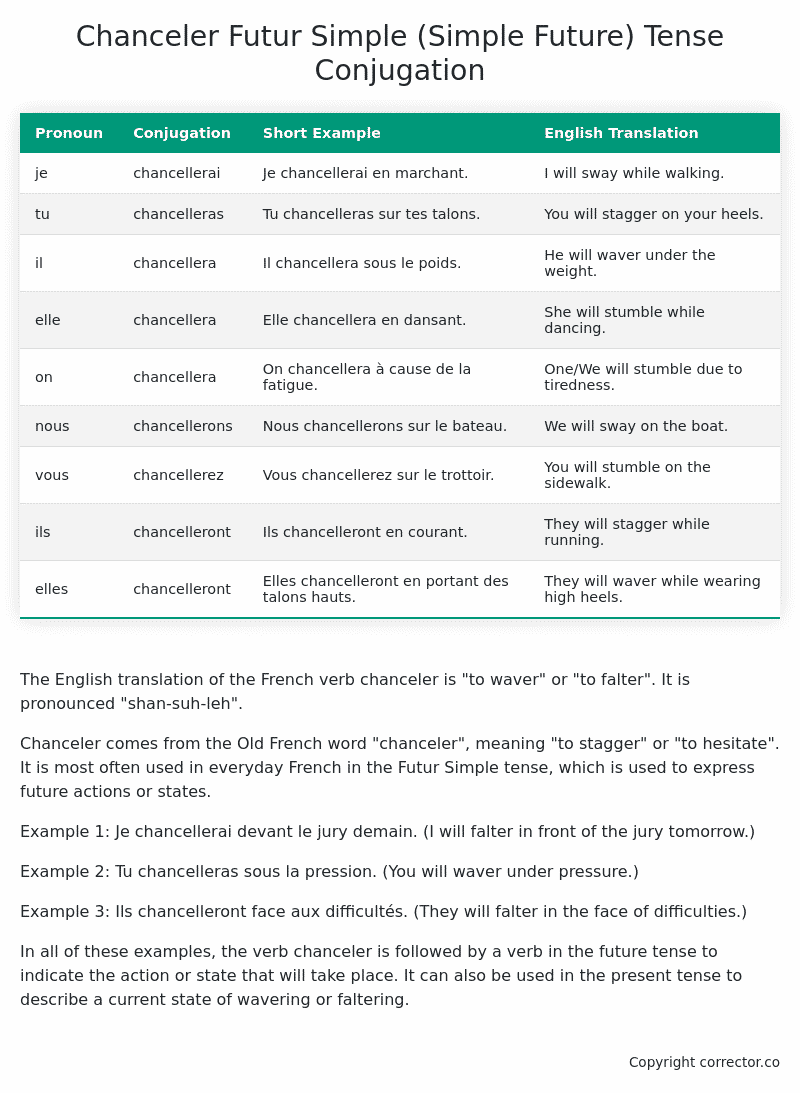Futur Simple (Simple Future) Tense Conjugation of the French Verb chanceler
Introduction to the verb chanceler
The English translation of the French verb chanceler is “to waver” or “to falter”. It is pronounced “shan-suh-leh”.
Chanceler comes from the Old French word “chanceler”, meaning “to stagger” or “to hesitate”. It is most often used in everyday French in the Futur Simple tense, which is used to express future actions or states.
Example 1: Je chancellerai devant le jury demain. (I will falter in front of the jury tomorrow.)
Example 2: Tu chancelleras sous la pression. (You will waver under pressure.)
Example 3: Ils chancelleront face aux difficultés. (They will falter in the face of difficulties.)
In all of these examples, the verb chanceler is followed by a verb in the future tense to indicate the action or state that will take place. It can also be used in the present tense to describe a current state of wavering or faltering.
Table of the Futur Simple (Simple Future) Tense Conjugation of chanceler
| Pronoun | Conjugation | Short Example | English Translation |
|---|---|---|---|
| je | chancellerai | Je chancellerai en marchant. | I will sway while walking. |
| tu | chancelleras | Tu chancelleras sur tes talons. | You will stagger on your heels. |
| il | chancellera | Il chancellera sous le poids. | He will waver under the weight. |
| elle | chancellera | Elle chancellera en dansant. | She will stumble while dancing. |
| on | chancellera | On chancellera à cause de la fatigue. | One/We will stumble due to tiredness. |
| nous | chancellerons | Nous chancellerons sur le bateau. | We will sway on the boat. |
| vous | chancellerez | Vous chancellerez sur le trottoir. | You will stumble on the sidewalk. |
| ils | chancelleront | Ils chancelleront en courant. | They will stagger while running. |
| elles | chancelleront | Elles chancelleront en portant des talons hauts. | They will waver while wearing high heels. |
Other Conjugations for Chanceler.
Le Present (Present Tense) Conjugation of the French Verb chanceler
Imparfait (Imperfect) Tense Conjugation of the French Verb chanceler
Passé Simple (Simple Past) Tense Conjugation of the French Verb chanceler
Passé Composé (Present Perfect) Tense Conjugation of the French Verb chanceler
Futur Simple (Simple Future) Tense Conjugation of the French Verb chanceler (this article)
Futur Proche (Near Future) Tense Conjugation of the French Verb chanceler
Plus-que-parfait (Pluperfect) Tense Conjugation of the French Verb chanceler
Passé Antérieur (Past Anterior) Tense Conjugation of the French Verb chanceler
Futur Antérieur (Future Anterior) Tense Conjugation of the French Verb chanceler
Subjonctif Présent (Subjunctive Present) Tense Conjugation of the French Verb chanceler
Subjonctif Passé (Subjunctive Past) Tense Conjugation of the French Verb chanceler
Subjonctif Imparfait (Subjunctive Imperfect) Tense Conjugation of the French Verb chanceler
Subjonctif Plus-que-parfait (Subjunctive Pluperfect) Tense Conjugation of the French Verb chanceler
Conditionnel Présent (Conditional Present) Tense Conjugation of the French Verb chanceler
Conditionnel Passé (Conditional Past) Tense Conjugation of the French Verb chanceler
L’impératif Présent (Imperative Present) Tense Conjugation of the French Verb chanceler
L’infinitif Présent (Infinitive Present) Tense Conjugation of the French Verb chanceler
Struggling with French verbs or the language in general? Why not use our free French Grammar Checker – no registration required!
Get a FREE Download Study Sheet of this Conjugation 🔥
Simply right click the image below, click “save image” and get your free reference for the chanceler Futur Simple tense conjugation!

Chanceler – About the French Futur Simple (Simple Future) Tense
Formation of Futur Simple
For regular -er verbs (e.g., parler – to speak)
For regular -ir verbs (e.g., finir – to finish)
For regular -re verbs (e.g., vendre – to sell)
Common Everyday Usage Patterns
Conditional Statements
Interactions with Other Tenses
Futur Antérieur
Conditional
Present
Summary
I hope you enjoyed this article on the verb chanceler. Still in a learning mood? Check out another TOTALLY random French verb conjugation!


